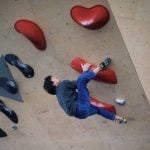
If the build to this summer’s Tokyo Olympics feels like déjà vu for the climbing industry, it’s because we have been here before. In the spring of 2020, the Olympic hype was reaching an apex. For example, USA Climbing held a press conference prior to the IFSC’s 2020 Pan-American Championships that was largely a way for the American Olympian climbers to meet the media. Also, profiles were done on the American Olympian climbers in outlets that ranged from local newspapers to endemic and non-endemic climbing outlets. Then, the world effectively shut down as a result of the pandemic; everything was cancelled or postponed, and much of the Olympic momentum was put on hold…until now.
The recent Tokyo 2020 Team USA Media Summit was a three-day virtual press conference that featured breakout sessions with the American Olympic athletes for all sports, including climbing. The event heralded some upcoming milestones: April 14th will mark 100 days until the start of the Tokyo Olympics, and May 16th will mark 100 days until the Tokyo Paralympics. Included in the Team USA Media Summit were reporters from NBC Sports, CNN, People, USA Today, The Salt Lake Tribune, and more. Even though the current Olympic momentum feels somewhat like a repeat of last year’s hype, it’s no less exciting, and in all likelihood the Tokyo Olympics will finally happen.
Here are some noteworthy points and comments made by the four American Olympians—Brooke Raboutou, Kyra Condie, Nathaniel Coleman, Colin Duffy—responding to various questions from the press during the Media Summit.

1. Colin Duffy’s food poisoning is becoming the stuff of legend—and rightly so
At the conclusion of the 2020 Pan-American Championships, it was revealed that Duffy had been sick during much of the event. Duffy’s sickness—from food poisoning—likely would have remained something of a quirky historical anecdote in the industry. But since Duffy’s victory at those Pan-American Championships resulted in an Olympic berth, his bout with food poisoning is an important and fascinating component to the 2020 Olympics climbing narrative. “It was definitely a wild ride; about the middle of the competition, during the qualification round, I just started feeling super sick and fatigued,” Duffy explained at the Media Summit, recalling the Pan-American Championships’ food poisoning woes. “I was able to just stay as healthy as possible through some holistic methods, and rest up for finals, and was able to compete at a high level and still qualify—which was definitely pretty chaotic. But I’m glad it worked out.”
2. Nathaniel Coleman’s first climbing love was…furniture
Nathaniel Coleman is famously a product of the Momentum Youth Team and coach Palmer Larsen in Coleman’s home of Salt Lake City, Utah. Since Coleman’s youth climbing days, he has moved on to train frequently at USA Climbing’s Training Center in Salt Lake City while still climbing at Momentum Millcreek. However, speaking to the press at the Media Summit, Coleman confessed that he readily climbed around his childhood house prior to ever visiting a climbing gym. As an 18-month-old, that meant scaling the home furnishings. “I guess I was climbing door frames, cupboards, my fridge—all sorts of stuff,” Coleman said. “As I got older I upgraded to trees and playgrounds and stuff. I guess it was just something that I was naturally inclined to do.”
3. The Combined format is the perfect embodiment of the famed Olympic motto
Past controversy and consternation related to the Tokyo Olympics’ unique Combined format has been covered at length. The fact that the IOC has chosen to abandon the three-discipline Combined format for the 2024 Paris Olympics is evidence that it is still not universally loved. However, while explaining the Combined format to the media, Kyra Condie pointed out that the Tokyo Olympics’ climbing format does dovetail well with the three Latin words that form the Olympic motto. “I think just the fact that climbing is in the Olympics really suits the Olympic motto, in general,” Condie said. “Citius, Altius, Fortius is Higher, Faster, Stronger, and it really relates to climbing, I think. Higher is lead climbing; Faster is speed climbing; and Stronger is bouldering. So, it’s kind of cool that there’s that relation to that.”

4. The Olympics’ postponement was a silver lining for speed improvements
Closely related to any discussion of the Combined format is the fact that none of the American Olympian climbers are traditionally “speed specialists.” However, that has not hindered their ability to improve at speed climbing, as evidenced most recently by Kyra Condie achieving a personal best time of 8:05 seconds in the finals of the National Team Trials. And, at the Media Summit, the Olympians revealed that the rescheduling of the Tokyo Olympics allowed more time to focus specifically on speed development, with the gains speaking for themselves. “I think all of us have learned a lot in the past year about how to better train for the Olympics since it is the first time climbing will be in it; there isn’t a “best way to train”—no one really knows, especially for this Combined format,” Brooke Raboutou explained. “So, I think that we’ve learned a lot and gotten to do some trial and error, and for speed climbing as well, more time on the wall has been really important for me and all of us. I would say the silver lining was just more time to train and more time to get stronger.”
5. An American climber had unique Olympic ties—prior to qualifying for Tokyo
Nathaniel Coleman famously punched his ticket for the Tokyo Olympics at the Olympic qualifier in Toulouse, France, in the fall of 2020. He hails from Salt Lake City, which hosted a Winter Olympics in 2002. Coleman was five years old at the time of those Winter Olympics—too young to remember any specifics about the event, yet he was enveloped in that Olympics’ orbit in a way that now seems somewhat prophetic. “I did recently learn that my dad—he was a for-fun pilot at the time—and he got hired to fly around the [Salt Lake City] Games and kind of do security,” Coleman said. “So, it was kind of cool to have that connection to it.”

6. Olympic watch-parties will likely become a summer trend
Although not a surprising decision in the ongoing pandemic era, the IOC’s recent choice to bar foreign fans from attending this summer’s Olympics received a lot of press. Largely lost in the publicity was the fact that this means family members of the Olympians will not be able to cheer on their loved ones in-person. Responding to a question at the Media Summit about what it’s like to know that family won’t be in attendance at the Olympics, Nathaniel Coleman said it was “a shame,” adding, “They love to watch me compete, whether it’s at a local event or at an Olympic event.” Kyra Condie explained that her mother, in particular, is a “huge Olympic fan” and will be improvising in a manner that will likely catch on as the world opens up but attending the Olympics remains impossible. “She’s already planning how she’s going to be watching it at home—and invite a bunch of friends over and maybe make it into an event,” Condie said. “So, that’s her plan—to make the best of the situation.” Just what all the watch-parties will look like will depend of course on regional Covid measures, but whether together or remote, big or small, the long-building Olympic hype will likely make them happen.

7. Climbing fans might be in for some surprising celebrations
At one point during the Media Summit, the four American Olympians were asked whether they are planning any sort of victory dance or podium celebration at the Tokyo Olympics. Colin Duffy and Kyra Condie did not indicate any such intentions, although Condie did say she’s always a fan of a “good, old-fashioned fist bump.” But Nathaniel Coleman and Brooke Raboutou were a bit more evasive. “I’ve been cooking up something for pretty much my whole life, but it’s super top-secret, so you’re just going to have to wait and see,” Coleman revealed. Raboutou added, “I’m definitely working on something as well. But I think most of all I usually just celebrate with a big smile. But I’ll see what I can come up with.”















